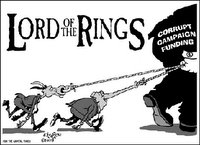Why do we let them get away with it?
 Why do we let our elected officials cut student loan programs, Medicaid, Medicare and other programs for America's families so they can continue to give more tax breaks to the top 5% of earners? This strategy has been proven to do nothing for the economy. It didn't work when Reagan tried it and it's not working now.
Why do we let our elected officials cut student loan programs, Medicaid, Medicare and other programs for America's families so they can continue to give more tax breaks to the top 5% of earners? This strategy has been proven to do nothing for the economy. It didn't work when Reagan tried it and it's not working now.What does work is to give tax breaks and other incentives to the working poor. If you want people to spend money, thus improving business and manufacturing, you give money to people who will go out and spend it as soon as they get it to meet basic needs for food, shelter, school clothes for the children, a car repair, a broken water heater, a long-deferred vacation, and so forth. You don't give it to wealthy people who are already parking their income in offshore tax havens and fancy cattle ranches.
Not only does giving breaks to those who need them most boost the cycling of money through the economy; it is also the right thing to do, morally and socially. Improving the lot of the less well off results in safer streets, better education, a more cohesive society, more community and national pride and a host of other benefits that distinguish an egalitarian democratic society from a third-world failed state.
Which we are in danger of becoming, as we slip far behind Europe and Asia in wireless technology and alternative energy, and our education system, once the pride of the world, makes do with second-rate teachers because we refuse to pay them more than office assistants. (See Thomas Friedman's latest column, courtesy of The Era. The guy is hardly a liberal whiner.)
Why do we put up with this? What are we, stupid? Somebody tell me, please.
(Photo courtesy of DemocraticUnderground.com)




